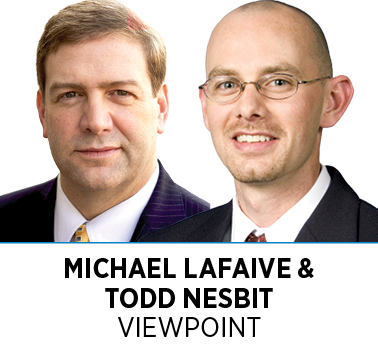Subscriber Benefit
As a subscriber you can listen to articles at work, in the car, or while you work out. Subscribe Now The U.S. system of governance has created 50 “laboratories of democracy,” a phrase made popular by former Supreme Court Justice Louis Brandeis. Each state has latitude in how its people are governed, which includes types and burdens of taxation.
The U.S. system of governance has created 50 “laboratories of democracy,” a phrase made popular by former Supreme Court Justice Louis Brandeis. Each state has latitude in how its people are governed, which includes types and burdens of taxation.
One such area involves taxes on cigarettes. Some states and other units of government impose practically punitive rates on cigarettes, while others impose relatively light ones.
These taxes are imposed typically for two major reasons: to help improve health outcomes and to raise revenue. Because of the differences in tax rates of adjacent states, however, otherwise law-abiding citizens and organized crime cells undermine both goals. A recent proposal to raise cigarette taxes by $2 per pack in Indiana will—by our estimation—increase smuggling dramatically and help enrich retailers in neighboring states, as well as their respective state treasuries.
We are economists who have created a statistical model to estimate the degree to which cigarette smuggling occurs in most states. We find that, through 2016, Indiana was a net-export state. Specifically, for each 100 packs of cigarettes consumed in the Hoosier State, another 17 were smuggled out to other states in pursuit of tax avoidance in those states. If the proposed tax hike becomes law, the smuggling flow will be reversed—and in dramatic fashion.
Using our model, we estimate that a $2 cigarette excise tax hike will move Indiana from exporting 17 percent more than it consumes to importing 34 percent of all cigarettes it consumes. As residents of both Michigan (LaFaive) and Indiana (Nesbit), we have a keen interest in what might happen if either state raises or lowers its cigarette excise tax.
This is not the first time we’ve looked at illicit border activities involving Indiana and Michigan. In 2008, we obtained a private set of cigarette sales data from a large Midwestern wholesaler. This allowed us to examine the sales to retailers in Michigan counties that touched Indiana’s border. In July 2007, Indiana hiked its per-pack cigarette tax to 99.5 cents from 55.5 cents. Michigan’s rate, by contrast, remained at $2 per pack. Our analysis indicated that, in the three months before the hike, sales to Michigan retailers from the wholesaler jumped 58 percent. In the months afterward, sales were still up, though slightly less, at 53 percent. Why?
Retailers knew that Indiana’s tax hike would make it less economically attractive for Michigan citizens to cross the border to buy cigarettes, so they prepared accordingly. If Indiana raises its excise tax more than 200 percent, to almost $3 per pack, shopping patterns will change even more than they did in 2007. We expect the tax increase to enrich retailers in Michigan, Ohio, Illinois and Kentucky, as well as each state’s treasury, as Hoosiers along the state lines purchase their smokes from retailers in our lower-tax neighbors.
None of our warnings about these consequences should suggest that we support smoking. Neither of us smoke cigarettes and don’t want to, nor would we encourage anyone else to start.
Those still consuming cigarettes today have a very strong preference for doing so. Raising Indiana’s excise tax rates above that of all four neighboring states is a recipe for disappointment. It will likely have little impact on Indiana’s smoking rate while simultaneously enriching sister states’ retailers and treasuries.•
__________
LaFaive is senior director of fiscal policy with the Mackinac Center for Public Policy in Midland, Michigan. Nesbit is an assistant professor of economics at Ball State University and an adjunct scholar with the Mackinac Center.
Please enable JavaScript to view this content.
